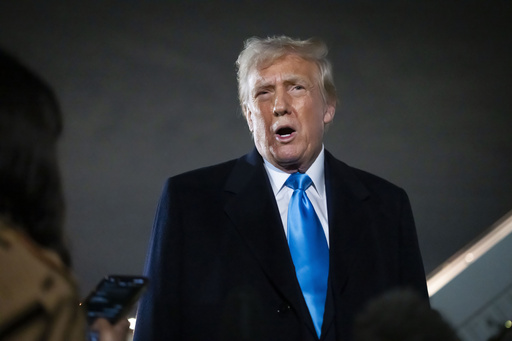CAPE TOWN, South Africa — President Donald Trump has announced plans to halt all financial assistance to South Africa, while also initiating an inquiry into the country’s land policies. He claimed that a significant human rights violation is occurring against white individuals, attributed to a newly implemented law regarding land expropriation.
Trump made this declaration on his Truth Social platform, stating that South Africa is “confiscating land” and treating specific groups of people “VERY BADLY.” He asserted that a “massive human rights violation” is readily visible in the nation, although he did not provide any specific examples or evidence to support his allegations. Trump emphasized his position by stating, “The United States won’t stand for it, we will act.” He committed to cutting off future funding to South Africa until a thorough investigation of the alleged situation is conducted.
In response, the South African government urged the Trump administration to gain a deeper understanding of the new land law, which aims to address the lingering impacts of the apartheid era that ended in 1994, characterized by decades of white minority dominance. President Cyril Ramaphosa stated that “the South African government has not confiscated any land” since the legislation was enacted, highlighting that no significant actions have taken place following its approval.
Historically, during apartheid, land was expropriated from the Black majority in South Africa, forcing them into designated regions. The government argues that this new legislation has been under discussion for several years to address these historical injustices.
Elon Musk, a notable ally of Trump and a South African native, has previously criticized the Ramaphosa administration, accusing it of exhibiting anti-white sentiments and even suggesting that it facilitates a “genocide” against white farmers. Experts, however, contend that while there are incidents of violence against white farmers, these occurrences reflect the broader high levels of violent crime affecting all communities in South Africa.
While addressing reporters, Trump remarked that the actions taking place involve land confiscation and are possibly “far worse” than previously stated. He did not clarify which policies he was targeting or specify which groups were affected. His comments seem to be aligned with the land expropriation law recently passed, which allows the government to take land for the public good under specific conditions.
The law has faced criticism from several South African groups who argue it may lead to the seizure of land owned by the white minority. However, officials maintain that property rights are still safeguarded and land can only be obtained under certain circumstances, particularly when it is not being utilized productively. The race of the landowner is not considered in this matter.
Ramaphosa’s administration emphasized that the new Expropriation Act is not a tool for confiscation, but rather a process mandated by the constitution to ensure fair access to land. The statement underscored that South Africa has historically employed expropriation laws that balance public land use with the rights of property owners.
Foreign Minister Ronald Lamola suggested that the Trump administration should utilize its investigation to gain a comprehensive understanding of South Africa’s policies within a constitutional framework. He encouraged a respectful and informed interaction regarding the nation’s democratic commitments.
U.S. funding plays a significant role in South Africa’s fight against HIV/AIDS through the President’s Emergency Plan for AIDS Relief (PEPFAR), contributing roughly $400 million annually. This financial support was already at risk after Trump imposed a freeze on foreign aid worldwide. Ramaphosa’s office noted that aside from PEPFAR, no other notable funding is provided by the United States to South Africa, although it remains America’s primary trading partner in Africa.
A civil rights organization representing the Afrikaans-speaking white minority in South Africa, which has contested the new law, cautioned that Trump’s proposed actions could adversely affect the South African populace. They requested that any punitive actions taken be aimed specifically at senior government officials.
Trump has voiced disapproval of South Africa’s government previously, particularly during his first term in 2018 when he claimed that land was being seized from white farmers, citing “large-scale killing of farmers.” His statements were met with criticism in South Africa for being misleading. Official crime statistics indicate that there are approximately 70 homicides daily in South Africa, with the majority of victims being from the Black community.



